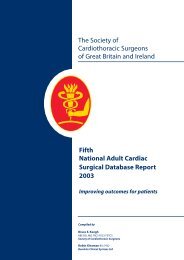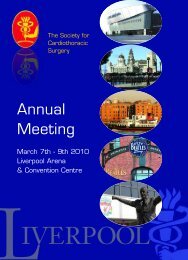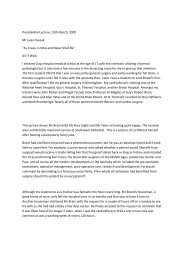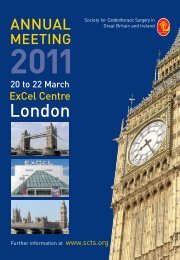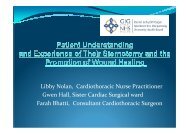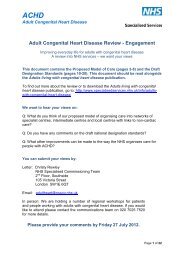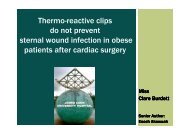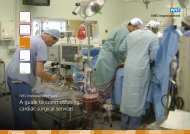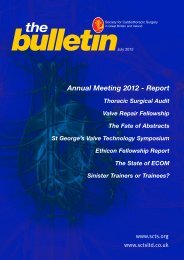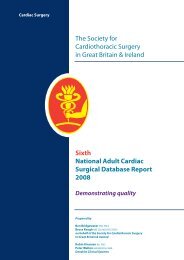Download - Society for Cardiothoracic Surgery
Download - Society for Cardiothoracic Surgery
Download - Society for Cardiothoracic Surgery
You also want an ePaper? Increase the reach of your titles
YUMPU automatically turns print PDFs into web optimized ePapers that Google loves.
July 2010 19<br />
The Working Group<br />
on Thoracic Surgical Audit<br />
Richard D Page<br />
Working Group Chairman<br />
Thoracic surgical audit <strong>for</strong> the SCTS continues to develop. Since<br />
2002, well over 95% of UK and Ireland activity has been<br />
captured as the Thoracic Register. The first Thoracic Blue Book<br />
was published in 2008.<br />
Thoracic Register returns <strong>for</strong> the years of activity between 2005<br />
and 2008 are now complete and have been published on the SCTS<br />
website. For 2008-9 activity, at the time of writing returns are still<br />
awaited from 4 out of the 41 active units (Barts/London Chest,<br />
Cork, Hammersmith, and Hull).<br />
The Register shows a steady increase in the amount of thoracic<br />
surgery carried out in the UK and Ireland over recent years.<br />
Despite the introduction of PET scanning there has been an<br />
increase in the number of primary lung cancers treated surgically;<br />
in 2007-8 there were 4333 resections. I believe this indicates an<br />
increase in access to thoracic surgery <strong>for</strong> patients being assessed<br />
<strong>for</strong> lung cancer treatment, particularly with the creation of a<br />
significant number of new consultant posts with a thoracic<br />
interest. In contrast although interest in VATS lobectomies <strong>for</strong><br />
primary cancer has never been higher, over 90% of resections are<br />
still carried out via traditional open techniques.<br />
For the 2009-10 returns, the Register will be expanded slightly to<br />
monitor activity in other specific areas of practice, <strong>for</strong> example<br />
mesothelioma, tracheal and mediastinal surgery, as well as<br />
capturing specific operations of interest <strong>for</strong> example lung<br />
reduction surgery and pectus repair.<br />
The number of Units able to contribute to the SCTS dataset has<br />
increased steadily with a total of 13 out of the 41 currently active<br />
thoracic units having contributed (Barts/London, Blackpool,<br />
Bristol, Coventry, Dublin Mater, Dublin St James, Exeter, Liverpool,<br />
Middlesbrough, Sheffield, South Manchester, UCLH and<br />
Wolverhampton). Between the years 2005-9 patient specific data<br />
on 3107 resections <strong>for</strong> primary cancers were reported by these<br />
units, making the possibility of a UK model of risk stratification<br />
becoming available soon.<br />
Although other hospitals may come on<br />
stream <strong>for</strong> 2009-10 data the main theme<br />
from Units unable to contribute is the<br />
absence of an infrastructure <strong>for</strong> thoracic<br />
surgical data collection within hospitals. I<br />
had been optimistic that this deficit could be<br />
corrected by allowing the SCTS dataset to be<br />
incorporated into the current on-line<br />
European <strong>Society</strong> of Thoracic Surgeons database. Un<strong>for</strong>tunately<br />
this has not been possible due to the issue of patient details<br />
having to be sent outside the country which is a clear risk to<br />
patient confidentiality. Although a specific online system may<br />
become available <strong>for</strong> use by SCTS members, I am grateful to<br />
members <strong>for</strong> continuing with the current system which involves<br />
sending an Excel spreadsheet <strong>for</strong> their Unit’s annual activity.<br />
The 2009 LUCADA report (which produced some details on<br />
surgical activity from data collected via lung cancer MDT’s)<br />
criticised the large variation in the surgical treatment of lung<br />
cancer throughout the country with resection rates varying from<br />
3% to 30%. Although some of this variation can be explained by<br />
patient factors, data inaccuracy and inconsistencies in definitions,<br />
the differences in access to thoracic surgery undoubtedly play a<br />
part. I believe that increasing the attendance of thoracic surgeons<br />
at lung cancer MDT’s and ensuring that there are enough<br />
surgeons in the country who have sufficient time and facilities to<br />
help treat patients effectively will go a long way to correcting<br />
improve this inequity <strong>for</strong> patients, and help improve overall cure<br />
rates. Accurate data is essential when arguing the case <strong>for</strong> more<br />
thoracic surgical staff and facilities and encourage all surgeons to<br />
contribute as much as possible to all data and audit initiatives<br />
looking at thoracic surgical practice within their hospitals and<br />
throughout the country<br />
Richard D. Page<br />
SCTS lead <strong>for</strong> Thoracic Surgical Audit<br />
The Fit Note<br />
The <strong>Society</strong> has been asked to draw the<br />
attention of its membership to the new<br />
Statement of Fitness <strong>for</strong> Work (or fit note)<br />
launched on 6 April this year. Whilst<br />
secondary care doctors do not write as<br />
many medical statements as our primary<br />
care colleagues, there are occasions<br />
when this is entirely appropriate and<br />
necessary.<br />
Dr Bill Gunnyeon, Chief Medical Adviser<br />
to the Department <strong>for</strong> Work and Pensions,<br />
has written to all Chief Executives and<br />
Medical Directors of NHS Trusts in<br />
England and Chief Executives of Health<br />
Boards in Scotland and Wales in order to<br />
communicate the changes being made.<br />
Isabelle Ferner<br />
Further in<strong>for</strong>mation on the Statement of<br />
Fitness <strong>for</strong> Work is available online at<br />
www.dwp.qov.uk/fitnote.



